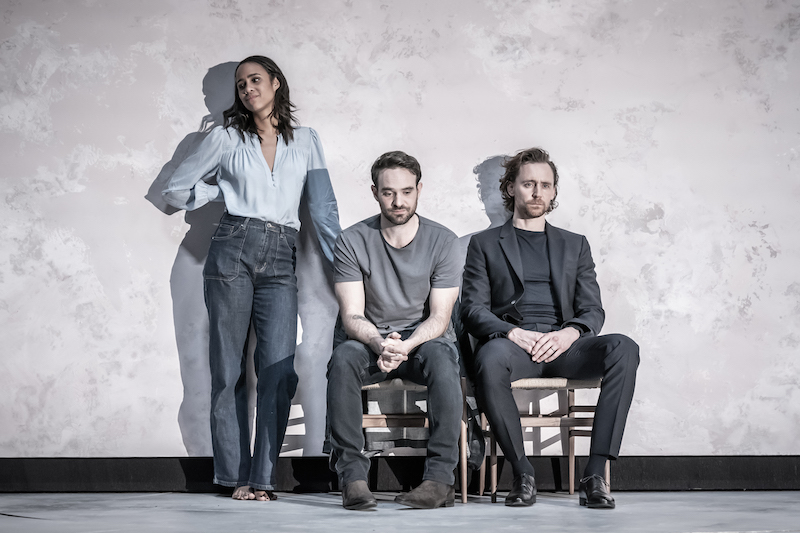The grand finale of Jamie Lloyd’s remarkable Pinter at the Pinter season is this starry production of one of the writer’s greatest – and certainly most personal – works, inspired by his extramarital affair with Joan Bakewell. The 1978 play is famous for its reverse-chronological structure, however Lloyd’s stylish, expressionistic take emphasises the daring not just of the formal trickery, but of the unsparing scrutiny of humanity.
Soutra Gilmour’s stark set resembles a gallery, with the tangled trio as its shades-of-grey exhibits; it’s a reminder, too, that these yarn-spinning schemers are all professional creatives, with Emma (Zawe Ashton) in the art world, husband Robert (Tom Hiddleston) a publisher, and Emma’s lover Jerry (Charlie Cox) – also Robert’s best friend – a literary agent. The three actors (picured below) are on stage throughout, further eliding the unspooling revelations about who knows what when, whose secrets are being uncovered, and how much the third person is always involved, lurking in the shadows.
The men teasingly reject Emma’s offer to come watch their squash game, but when they’re alone, sat opposite one another like combatants poised to strike, Emma is there between them. Robert physically invades the Kilburn flat where Emma and Jerry meet, and – in a brilliant use of the stage revolve – Robert clings to his young daughter (the reminder of the children involved, plus a questioned paternity) while the lovers embrace, the men locking eyes as Emma asks whether Jerry thinks about changing his life. Meanwhile, the audience plays voyeur and co-conspirator, drawn into the deceit and subsequent damage. Occasionally, Lloyd’s flourishes lend too much portentousness to the simmering exchanges, particularly in the early scenes; the play’s power lies in its combination of surface middle-class British politeness and underlying devastation, and in the gradual import of repeated references (hot young author Casey; the significance of squash, and of Yeats). The sparse design, unchanging costumes and artful staging – beautifully lit by Jon Clark – also make Pinter’s timeline and immaculate build-up of disclosures slightly trickier to follow, as well as distancing us from some of the emotional beats.
Occasionally, Lloyd’s flourishes lend too much portentousness to the simmering exchanges, particularly in the early scenes; the play’s power lies in its combination of surface middle-class British politeness and underlying devastation, and in the gradual import of repeated references (hot young author Casey; the significance of squash, and of Yeats). The sparse design, unchanging costumes and artful staging – beautifully lit by Jon Clark – also make Pinter’s timeline and immaculate build-up of disclosures slightly trickier to follow, as well as distancing us from some of the emotional beats.
But Lloyd’s approach does give vital space for the actors to explore, and a dynamite set of performances amply rewards it. Ashton’s Emma (pictured below with Hiddleston) has an androgynous quality, in jeans and opening the play sat with legs spread, adding an interesting new layer to this knotty love triangle, in which identities shift and merge as each mirrors and plays against their companion. She’s also adept at conveying Emma’s slippery duplicity, her determinedly contained pain, and the cynical weariness of infidelity when it loses the sheen of romance.
Cox is very funny as the seemingly genial but deeply hypocritical Jerry, who protests when others betray his trust – wounded pride underscoring the fact that it’s knowledge, not sex, that holds true power here. He has an effectively smouldering chemistry with Ashton, convincing both as giddy new lovers and as dangerous exes who slip back into intimacy with a single word, and also plays exceptionally well off Hiddleston as they needle and spar, affection warped into competition. The latter climaxes in a superb set-piece, framed by Eddie Arnold’s slighted Italian waiter, as, over lunch, Cox’s panicked Jerry tries to remember what he is and isn’t supposed to know outside of his affair, while Hiddleston’s Robert grows increasingly menacing, topping up their wine to an absurd degree, stabbing his melon, and – in a twisted version of a smile – baring his teeth like a tiger.
The latter climaxes in a superb set-piece, framed by Eddie Arnold’s slighted Italian waiter, as, over lunch, Cox’s panicked Jerry tries to remember what he is and isn’t supposed to know outside of his affair, while Hiddleston’s Robert grows increasingly menacing, topping up their wine to an absurd degree, stabbing his melon, and – in a twisted version of a smile – baring his teeth like a tiger.
Yet just when the scene teeters close to farce, Hiddleston snaps it back with a heart-rending delivery of Robert’s recollection of his solitary time on Torcello, during what we now know was a turbulent trip to Venice with Emma. It was, he admits, a moment of happiness – “Such a rare thing”. Hiddleston has the great actor’s gift of stillness; when Robert learns of the affair, he doesn’t rage, but tears glitter in his eyes and gradually spill down his cheeks, unchecked vulnerability springing forth from this coolly controlled man. It’s extraordinary to witness.
Ben and Max Ringham contribute an evocative sound design, with records scratching and skipping as a clock ticks insistently. Time is key to Lloyd’s memorable reading, as the characters look back and forward, weighing the moment against the life, the impulsive choice against the consequences, and the fragile commitment to another against the driving needs of the self. A searing climax to a thrilling season.
- Betrayal at the Harold Pinter Theatre until 1 June
- Read more theatre reviews on theartsdesk















Add comment